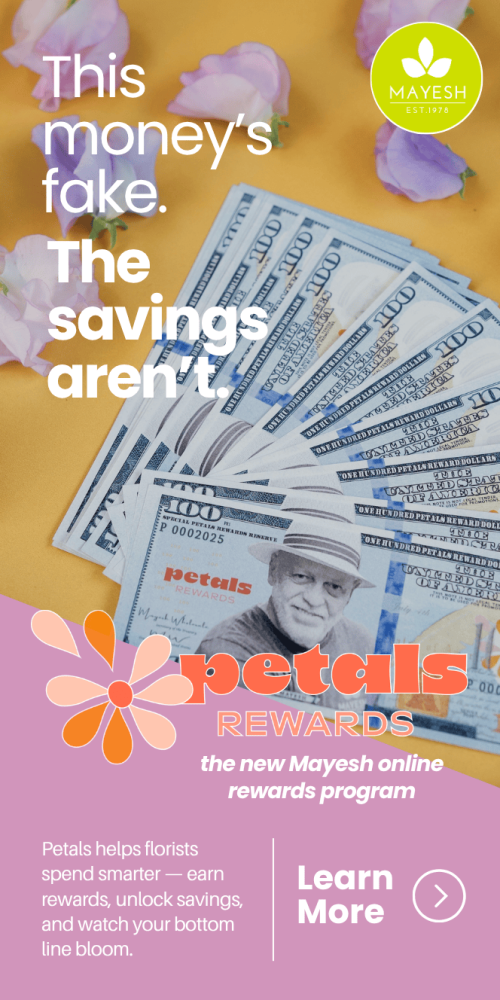Randy Wooten AIFD, PFCI, CFD, GMF of RW Wholesale in Douglas, Georgia suggests an excellent way to get involved with increased floral industry training is by mentoring interested FFA students. Participating in FFA – Future Farmer of America events is a natural resource for cultivating energetic new talent for the floral industry.
Read Full Article Here
Source: Oasis Floral Products

Florists across the country are experiencing a shortage of trained floral designers. While that’s one area of floriculture, there are endless floral career opportunities other than designing with flowers that are also waiting to be filled. Introducing FFA to the vast number of floriculture careers is one viable option.
The National FFA Organization topped over one million student members in 2024, across the United States, Puerto Rico, and the U.S. Virgin Islands. Membership in FFA offers these participating individuals diverse agricultural and leadership opportunities. How can we connect with these outstanding young people who are a part of the work force of our future?
Floral industry training
Randy Wooten AIFD, PFCI, CFD, GMF of RW Wholesale in Douglas, Georgia suggests an excellent way to get involved with increased floral industry training is by mentoring interested FFA students. Participating in FFA – Future Farmer of America events is a natural resource for cultivating energetic new talent for the floral industry.
Today’s evolved National FFA Organization is not just for members who want to be farmers. It is an active institution committed to guiding the individual student to personal achievement in leadership, personal growth, and career success through agricultural education.
Randy encourages florists to volunteer with FFA to introduce students to the many career opportunities available. Often people who choose floral careers come from a farm, landscape, floral, or small business, family background that values nature and natural materials. While volunteering to mentor a local FFA member in his flower shop, Randy discovered his passion for training interested students. His hope is to inspire them to choose a career in the floral industry.
“One of the biggest challenges the program faces is that for many FFA advisors, floral design or the floral industry skills are not in their wheelhouse,” explains Randy. “They cover many areas of career development. Floral design and floriculture are just one area of interest. In many cases, they have no clue where to begin.” They need additional resources.
Georgia floral design clinic
Hoping to help, Randy developed a statewide floral design clinic ten years ago that’s held annually in conjunction with the Georgia FFA Association. The clinic serves 200+ agriculture students and Georgia FFA advisors each year. Participants learn basics such as how to design boutonnieres or wrist corsages, or create more advanced designs like bouquets and both water and foam-based arrangements. Classes include pricing, floral trends, and flower care under the guidance of floral professionals. Opportunities that many students in the classroom won’t have otherwise.
Randy suggests that an easy way for floral businesses to get involved is to reach out in your own community offering to mentor with floral design training. Contact a local FFA chapter – middle school, junior high, or high school. Communicate with their FFA advisor to let them know that you are a volunteer resource and available to help. “We would love for as many people as possible to get involved.”
You can also reach out and make yourself known on a state level. California, Texas, and Georgia all have strong design workshops, clinics, and certification programs. “If you don’t have a contact in your state, you can always reach out to me. I can provide you with a state supervisor who is in charge of floriculture or floral design in your state,” offers Randy.
FFA National Convention
On the National FFA level, a national convention is held every year, usually the last week in October. This year’s event was held in Indianapolis, Indiana. “They are always looking for volunteers for the career development event. It takes about 65 volunteers to man the 10 different segments,” Randy explains.
There are many different ways that you can contribute. Not all volunteers need be a floral designer, or in a floral or horticultural career. For example, one event component offers a mock interview. Professionals or business people are needed to facilitate these interviews.
“I’ll never forget my first trip to National Convention. Even though I was a product of FFA and grew up in it, I never attended National Convention until I became part of that committee. It was truly overwhelming.” shares Randy. “It was amazing to watch these 15, 16, 17-year-olds take and command the stage like they did.” If they display that much confidence at such a young age, think of what they can accomplish over a lifetime!
A need for volunteers
While not everyone wants to work with a design knife at a design bench, there is a wide range of other job opportunities. We need to introduce FFA members to the variety of jobs available within the floral industry. Growers, importers, wholesalers, retailers, chemists, marketers, administrators, graphic artists, salespersons, event planners, product development specialists, social marketing specialists, floral educators, accountants, the list goes on and on. The challenge is to bring these opportunities to the attention of young FFA members for consideration as they develop their career path.
In Randy’s floral clinic in Georgia this year, they were only able to accommodate 270 kids. A long waiting list of hopeful would-be participants signed up just in case someone canceled. “The interest is there,” explains Randy. “We just don’t have the manpower. I wish we were able to bring more participants to the table, but we need more adult volunteers.
While participating on a larger, long distance level may not be feasible for you, individual businesses can participate on a smaller scale. There are things that can be accomplished in your own flower shop, agricultural, horticultural, or floral business. An advantage here is this keeps the knowledge, skill, and talent local and helps the student to establish themselves in their particular area.
It’s interesting that while a volunteer’s focus is on assisting FFA with its training programs, very often this investment of time comes back to you, your business, or your community. Randy experienced a personal situation where his investment in a young FFA member came back to reward him and his community.
Investing in local talent
“I mentored and worked locally in my shop with a young lady for five years. She won the FFA state contest for floral design,” Randy begins. “When she graduated, I had hoped she would go into the floral industry. However, she left Coffee County and went to Georgia Tech. She earned a Master’s Degree in engineering. After graduation, to my surprise, she moved back home to Douglas, Georgia and started a floral event company. I was thrilled.”
“Two years later she purchased my retail shop and is continuing my grandmother and great grandmother’s legacy with a fresh new look,” Randy continues. “They’re just killing it. They’re young. They know social media. I couldn’t be prouder. She’s just one of many success stories that we have in Georgia. I know of other students who are now either working in a shop or they own a shop. It’s encouraging and very rewarding.”
Building life skills
Randy recalls being a very shy kid that never wanted draw attention to himself. “I never stood up in front of the class and spoke, but FFA helped me tremendously because it put me out there. If you could have told 15-year-old Randy Wooten that at some point in my life, I would be standing onstage at AIFD – American Institute of Floral Designers, speaking to hundreds of people I would have said you were crazy. However, it was through those mentors teaching life skills that I was helped a lot. You can see why I’m very passionate about the program.”
The main goal of FFA career development is building life skills. The techniques learned for working with flowers and plants can be used in a career, hobby, relaxation, healing, or just for personal pleasure. Even if students never use what they’ve learned other than to decorate their own homes or arrange flowers for their personal events, if they learn to celebrate life with flowers – that investment of time has served its purpose.
“I’ve been encouraged over the years during my involvement,” concludes Randy. “If I can be of any service to you in finding your place to volunteer, please reach out. We have resources. I can put you in contact with the National Superintendent of Floriculture. It’s a really great organization.”
How could you help introduce FFA members in your area to a career in floriculture?
Subscribe now!
How we Bloom podcast is available for our listeners and the Floral Hub Blog for readers. You can find both at oasisfloralproducts.com.























